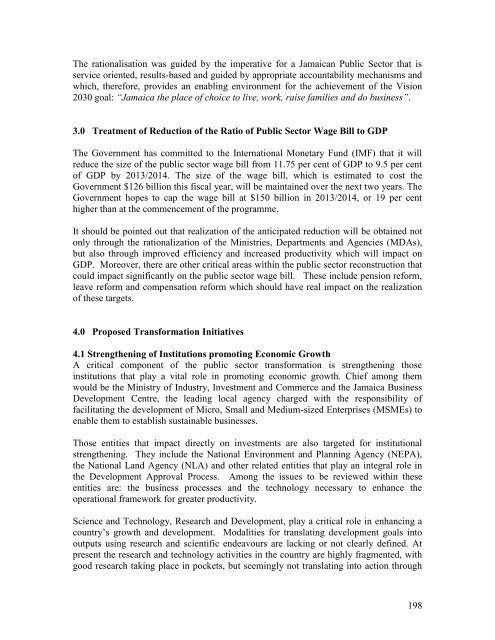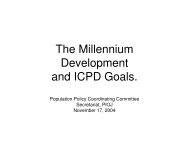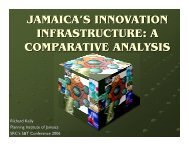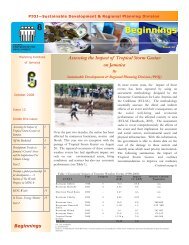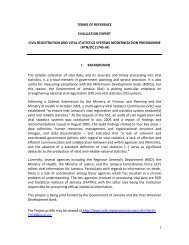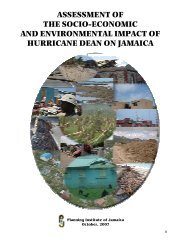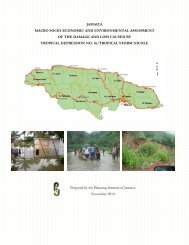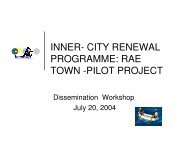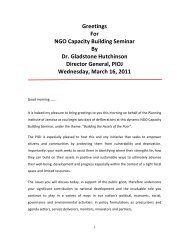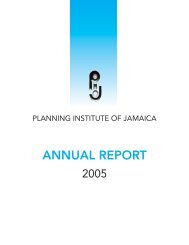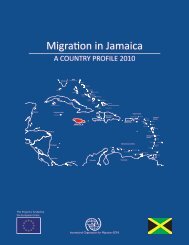PIOJ Growth-Inducement Strategy - Planning Institute of Jamaica
PIOJ Growth-Inducement Strategy - Planning Institute of Jamaica
PIOJ Growth-Inducement Strategy - Planning Institute of Jamaica
You also want an ePaper? Increase the reach of your titles
YUMPU automatically turns print PDFs into web optimized ePapers that Google loves.
The rationalisation was guided by the imperative for a <strong>Jamaica</strong>n Public Sector that is<br />
service oriented, results-based and guided by appropriate accountability mechanisms and<br />
which, therefore, provides an enabling environment for the achievement <strong>of</strong> the Vision<br />
2030 goal: “<strong>Jamaica</strong> the place <strong>of</strong> choice to live, work, raise families and do business”.<br />
3.0 Treatment <strong>of</strong> Reduction <strong>of</strong> the Ratio <strong>of</strong> Public Sector Wage Bill to GDP<br />
The Government has committed to the International Monetary Fund (IMF) that it will<br />
reduce the size <strong>of</strong> the public sector wage bill from 11.75 per cent <strong>of</strong> GDP to 9.5 per cent<br />
<strong>of</strong> GDP by 2013/2014. The size <strong>of</strong> the wage bill, which is estimated to cost the<br />
Government $126 billion this fiscal year, will be maintained over the next two years. The<br />
Government hopes to cap the wage bill at $150 billion in 2013/2014, or 19 per cent<br />
higher than at the commencement <strong>of</strong> the programme.<br />
It should be pointed out that realization <strong>of</strong> the anticipated reduction will be obtained not<br />
only through the rationalization <strong>of</strong> the Ministries, Departments and Agencies (MDAs),<br />
but also through improved efficiency and increased productivity which will impact on<br />
GDP. Moreover, there are other critical areas within the public sector reconstruction that<br />
could impact significantly on the public sector wage bill. These include pension reform,<br />
leave reform and compensation reform which should have real impact on the realization<br />
<strong>of</strong> these targets.<br />
4.0 Proposed Transformation Initiatives<br />
4.1 Strengthening <strong>of</strong> Institutions promoting Economic <strong>Growth</strong><br />
A critical component <strong>of</strong> the public sector transformation is strengthening those<br />
institutions that play a vital role in promoting economic growth. Chief among them<br />
would be the Ministry <strong>of</strong> Industry, Investment and Commerce and the <strong>Jamaica</strong> Business<br />
Development Centre, the leading local agency charged with the responsibility <strong>of</strong><br />
facilitating the development <strong>of</strong> Micro, Small and Medium-sized Enterprises (MSMEs) to<br />
enable them to establish sustainable businesses.<br />
Those entities that impact directly on investments are also targeted for institutional<br />
strengthening. They include the National Environment and <strong>Planning</strong> Agency (NEPA),<br />
the National Land Agency (NLA) and other related entities that play an integral role in<br />
the Development Approval Process. Among the issues to be reviewed within these<br />
entities are: the business processes and the technology necessary to enhance the<br />
operational framework for greater productivity.<br />
Science and Technology, Research and Development, play a critical role in enhancing a<br />
country’s growth and development. Modalities for translating development goals into<br />
outputs using research and scientific endeavours are lacking or not clearly defined. At<br />
present the research and technology activities in the country are highly fragmented, with<br />
good research taking place in pockets, but seemingly not translating into action through<br />
198


